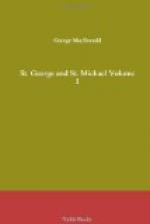But her following words had touched him—whether to fine issues or not remained yet poised on the knife-edge of the balancing will. His first emotion partook of anger. As soon as she was out of sight a spell seemed broken, and words came.
‘A boy, indeed, mistress Dorothy!’ he said. ’If ever it come to what certain persons prophesy, you may wish me in truth, and that for the sake of your precious bishops, the boy you call me now. Yes, you are right, mistress, though I would it had been another who told me so! Boy indeed I am—or have been—without a thought in my head but of her. The sound of my father’s voice has been but as the wind of the winnowing fan. In me it has found but chaff. If you will have me take a side, though, you will find me so far worthy of you that I shall take the side that seems to me the right one, were all the fair Dorothies of the universe on the other. In very truth I should be somewhat sorry to find the king and the bishops in the right, lest my lady should flatter herself and despise me that I had chosen after her showing, forsooth! This is master Herbert’s doing, for never before did I hear her speak after such fashion.’
While he thus spoke with himself, he stood, like the genius of the spot, a still dusky figure on the edge of the night, into which his dress of brown velvet, rich and sombre at once in the sunlight, all but merged. Nearly for the first time in his life he was experiencing the difficulty of making up his mind, not, however, upon any of the important questions, his inattention to which had exposed him to such sudden and unexpected severity, but merely as to whether he should seek her again in the company of her mother and Mr. Herbert, or return home. The result of his deliberation, springing partly, no doubt, from anger, but that of no very virulent type, was, that he turned his back on the alley, passed through a small opening in the yew hedge, crossed a neglected corner of woodland, by ways better known to him than to any one else, and came out upon the main road leading to the gates of his father’s park.
CHAPTER II.
Richard and his father.
Richard Heywood, as to bodily fashion, was a tall and already powerful youth. The clear brown of his complexion spoke of plentiful sunshine and air. A merry sparkle in the depths of his hazel eyes relieved the shadows of rather notably heavy lids, themselves heavily overbrowed—with a suggestion of character which had not yet asserted itself to those who knew him best. Correspondingly, his nose, although of a Greek type, was more notable for substance than clearness of line or modelling; while his lips had a boyish fulness along with a definiteness of bow-like curve, which manly resolve had not yet begun to compress and straighten out. His chin was at least large enough not to contradict the promise of his face; his shoulders were square, and his chest and limbs well developed: altogether it was at present a fair tabernacle—of whatever sort the indwelling divinity might yet turn out, fashioning it further after his own nature.




